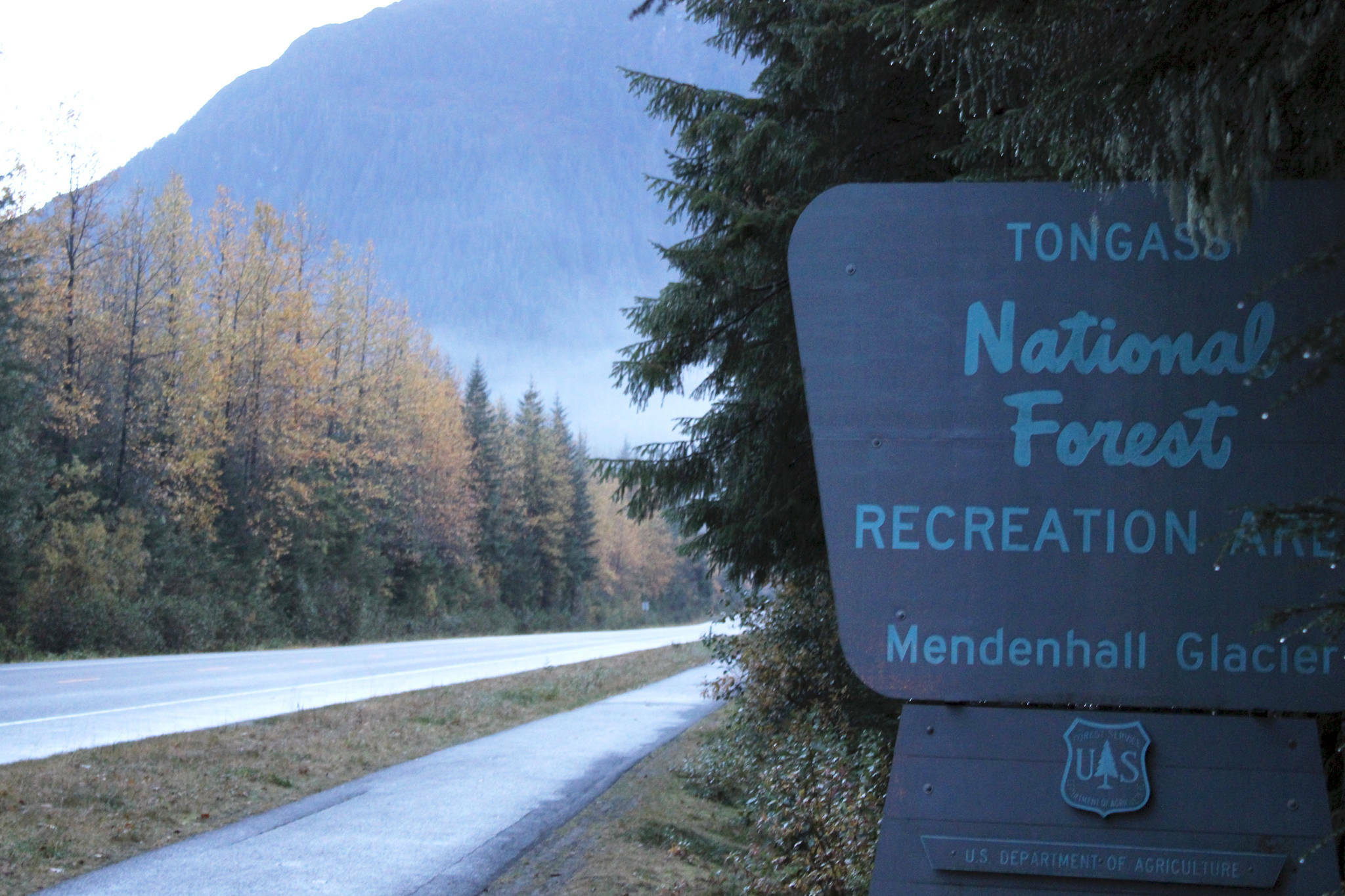This article has been updated to include additional information.
The so-called Roadless Rule banning logging and road-building on more than nine million acres in the Tongass National Forest has been formally reinstated, the Biden administration announced Wednesday.
The announcement, overturning a 2020 policy by former President Donald Trump opening the forest area to development, thrilled local environmental groups and incensed statewide Republican leaders, including U.S. Sen. Dan Sullivan who vowed to retaliate by blocking President Joe Biden’s nominees.
At 16.7-million acres the Tongass National Forest is the world’s largest intact tract of coastal temperate rainforest, making it critical for carbon sequestration and carbon storage to help mitigate climate change, the U.S. Forest Service stated in a news release announcing the reinstatement.
“Restoring roadless protections listens to the voices of Tribal Nations and the people of Southeast Alaska while recognizing the importance of fishing and tourism to the region’s economy,” U.S. Agriculture Secretary Tom Vilsack said in a prepared statement.
The reinstatement is the latest development in more than two decades of battles over the Roadless Rule protections initially enacted in 2001 under a policy initiated by former President Bill Clinton. Those skirmishes have generally pitted conservative politicians against conservationists.
However, U.S. Rep. Mary Peltola, a Democrat elected to Alaska’s lone House seat last year, issued a statement Wednesday expressing concern about the decision.
“I remain concerned about the reimposition of the Roadless Rule for the Tongass National Forest area because I firmly believe that impacted Alaskan communities should determine how to use their land,” she said. “This rule could leave communities in the designated roadless area with even fewer options for economic activity and development, including crucial renewable energy projects that can’t be built or connected to local grids because of these regulations. We should be updating our regulations to account for the present and future needs of Southeast Alaska.”
Sullivan, who on Tuesday issued a Facebook “update” attacking the Biden’s administration for a multitude of policies the senator characterized as federal overreach, added the reinstatement of the Roadless Rule to that list in a prepared statement Wednesday.
“I’ve implored Secretary Vilsack repeatedly to work with us and to not lock up our state,” he said. “My message to hard-working Alaskans who are being crushed and utterly disregarded by this administration: I will fight this decision with everything in my power, including through my Senate oversight responsibilities and by holding relevant nominees wherever possible.”
Alaska’s other U.S. senator, Republican Lisa Murkowski, also denounced the reinstatement in a prepared statement.
“The Roadless Rule should never have applied to the Tongass, and the Biden administration’s decision to reinstate it is federal paternalism at its worst,” she said. “Roughly 80 percent of the Tongass is already protected through existing law, land use designations, and the forest planning process, and there is no threat of large-scale development from timber harvesting or any other activity. With this decision, the Biden administration is turning the Tongass into a political football, where access changes with each new President and creates whiplash for those who might want to invest or build in Southeast Alaska.”
Similar sentiments were expressed by Republican Gov. Mike Dunleavy who, while initiating an effort to stabilize the state’s long-term finances via carbon offsets that include leaving forests unharvested, stated the Roadless Rule and Tongass aren’t the places for that to occur.
“This ruling is a huge loss for Alaskans,” Dunleavy said in a statement posted on his official social media accounts. “Alaskans deserve access to the resources that the Tongass provides — jobs, renewable energy resources and tourism, not a government plan that treats human beings within a working forest like an invasive species.”
Among the numerous people expressing support for the reinstatement was Joel Jackson, president of the Organized Village of Kake, in a news release issued by the Southeast Alaska Conservation Council quoting a large number of Alaska Native, environmental and other officials favoring the decision.
“The Tongass Roadless Rule is important to everyone,” Jackson said. “The old-growth timber is a carbon sink, one of the best in the world. It’s important to our way of life — the streams, salmon, deer, and all the forest animals and plants.”
Also quoted in SEACC’s release is Linda Behnken, a commercial fisher and executive director of the Alaska Longline Fishermen’s Association.
“We are thrilled and relieved to know the Tongass’ remaining unroaded areas will remain intact vibrant forests for generations to come,” she said. “Our fisheries depend on healthy habitat, and with climate change driving ocean warming, protecting habitat is increasingly important to the fish, the fisheries, and the coastal fishing communities. This is welcome news.”
Jim Clark, a Juneau attorney opposed to Roadless Rule protections for the Tongass, told The New York Times on Wednesday he has emphasized to Biden administration officials the economic benefits of some road construction are critical and can be achieved without harming the ecology.
Among other regional officials concerned about Roadless Rule restrictions is Tessa Axelson, executive director of the Alaska Forest Association, who told the Southeast Conference at its annual meeting in Ketchikan last year the timber industry — which has seen the number of jobs in the region decline from about 3,500 in 1991 to 300 last year — is facing the threat of climate-related disease affecting trees in the Tongass National Forest in addition to barriers the reinstatement of the Roadless Rule will cause.
Also, Deantha Skibinski, executive director of the Alaska Miners Association, said during the same conference that regional industry leaders are trying to convince federal officials to conduct their first mineral vales study in the region since 1991 to better focus future projects. The United States Geological Survey in 2008 found 148 mineral deposits in the region, but Skibinski and other state officials say an updated study will more accurately show the economic potential of the region.
• Contact reporter Mark Sabbatini at mark.sabbatini@juneauempire.com

